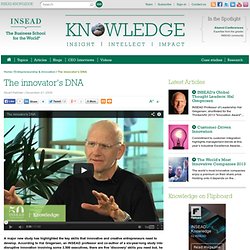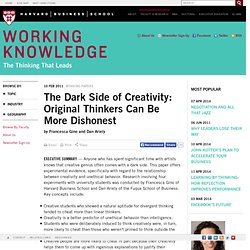

How Great Entrepreneurs Think. What distinguishes great entrepreneurs?

Discussions of entrepreneurial psychology typically focus on creativity, tolerance for risk, and the desire for achievement—enviable traits that, unfortunately, are not very teachable. So Saras Sarasvathy, a professor at the University of Virginia's Darden School of Business, set out to determine how expert entrepreneurs think, with the goal of transferring that knowledge to aspiring founders. While still a graduate student at Carnegie Mellon, Sarasvathy—with the guidance of her thesis supervisor, the Nobel laureate Herbert Simon—embarked on an audacious project: to eavesdrop on the thinking of the country's most successful entrepreneurs as they grappled with business problems.
She required that her subjects have at least 15 years of entrepreneurial experience, have started multiple companies—both successes and failures—and have taken at least one company public. Do the doable, then push it. Innovation; Innovator's DNA. A major new study has highlighted the key skills that innovative and creative entrepreneurs need to develop.

According to Hal Gregersen, an INSEAD professor and co-author of a six-year-long study into disruptive innovation involving some 3,500 executives, there are five 'discovery' skills you need but, he says, you don't have to be 'great in everything. A major new study involving some 3,500 executives has highlighted the key skills that innovative and creative entrepreneurs need to develop. The Dark Side of Creativity: Original Thinkers Can Be More Dishonest.
Author Abstract Creativity is a common aspiration for individuals, organizations, and societies.

Here, however, we test whether creativity increases dishonesty. We propose that a creative personality and creativity primes promote individuals' motivation to think outside the box and that this increased motivation leads to unethical behavior. In four studies, we show that participants with creative personalities who scored high on a test measuring divergent thinking tended to cheat more (Study 1); that dispositional creativity is a better predictor of unethical behavior than intelligence (Study 2); and that participants who were primed to think creatively were more likely to behave dishonestly because of their creativity motivation (Study 3) and greater ability to justify their dishonest behavior (Study 4).